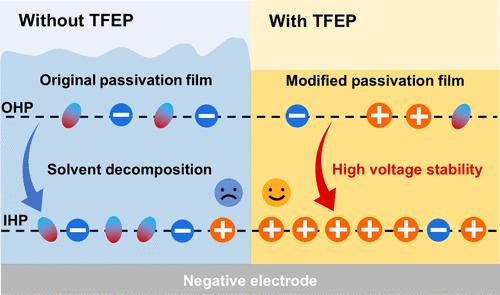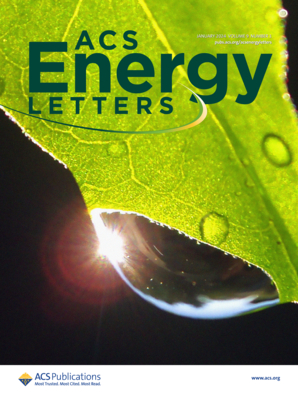Ionic Exchange Mechanism in Electrical Double Layer Induced by Stable Passivation Film Boosts High Voltage Performance in Supercapacitors
IF 19.3
1区 材料科学
Q1 CHEMISTRY, PHYSICAL
引用次数: 0
Abstract
Constructing a stable passivation film at the negative electrode–electrolyte interface is an effective strategy for optimizing the high voltage stability of propylene carbonate-based electrochemical double-layer capacitors (EDLC). However, the role of passivation film composition in determining high voltage performance is still being established. Herein, the effect of passivation film composition on the energy storage mechanism and high voltage performance is investigate. The modified passivation film inhibits the specific adsorption of anions; thus, the energy storage mechanism is altered to ionic exchange from co-ion desorption. This mechanism inhibits solvents from entering the inner Helmholtz plane, thus effectively reducing solvent decomposition and inhibiting rapid thickening of the passivation film. As expected, the floating stabilization time of EDLC utilizing this electrolyte at 3.3 V increases to 2090 h, which is 4.6 times longer than that for those utilizing commercial electrolyte. This work provides a new perspective for the development of high voltage EDLC.

求助全文
约1分钟内获得全文
求助全文
来源期刊

ACS Energy Letters
Energy-Renewable Energy, Sustainability and the Environment
CiteScore
31.20
自引率
5.00%
发文量
469
审稿时长
1 months
期刊介绍:
ACS Energy Letters is a monthly journal that publishes papers reporting new scientific advances in energy research. The journal focuses on topics that are of interest to scientists working in the fundamental and applied sciences. Rapid publication is a central criterion for acceptance, and the journal is known for its quick publication times, with an average of 4-6 weeks from submission to web publication in As Soon As Publishable format.
ACS Energy Letters is ranked as the number one journal in the Web of Science Electrochemistry category. It also ranks within the top 10 journals for Physical Chemistry, Energy & Fuels, and Nanoscience & Nanotechnology.
The journal offers several types of articles, including Letters, Energy Express, Perspectives, Reviews, Editorials, Viewpoints and Energy Focus. Additionally, authors have the option to submit videos that summarize or support the information presented in a Perspective or Review article, which can be highlighted on the journal's website. ACS Energy Letters is abstracted and indexed in Chemical Abstracts Service/SciFinder, EBSCO-summon, PubMed, Web of Science, Scopus and Portico.
 求助内容:
求助内容: 应助结果提醒方式:
应助结果提醒方式:


